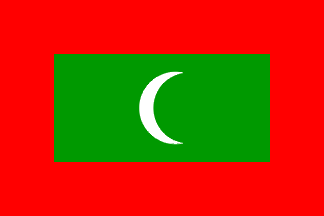 image by Zoltan Horvath, 5 July 2024
image by Zoltan Horvath, 5 July 2024
Last modified: 2025-03-08 by ian macdonald
Keywords: maldives | divehi |
Links: FOTW homepage |
search |
disclaimer and copyright |
write us |
mirrors
 image by Zoltan Horvath, 5 July 2024
image by Zoltan Horvath, 5 July 2024
Flag adopted 25 July 1965, coat of arms adopted in 1965.
Proportion: 2:3
Description: A red flag with a green rectangle panel in the
middle, charged with a white crescent pointing towards the fly
Use: on land, as the national and civil flag; at sea, as the national and civil ensign.
On this page:
See also:
Construction sheet 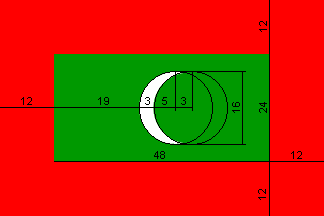 image by Željko Heimer, 30 September 2002
image by Željko Heimer, 30 September 2002
Quoting the website of the Permanent Mission of the Republic of Maldives to the United Nations:
The National Flag of the Republic of Maldives is rectangular in form, its width being two-thirds of its length. The flag comprises of a green rectangle with a crescent in the centre and surrounded by a red border.
The width of the red border is one-fourth of the width of the flag. The width of the green rectangle is half of the width of the flag while its length is two-thirds of the length of the flag.
The radii of both curvatures of the crescent are one-third of the width of the green rectangle. They are drawn from two points on a centre line across the length of the green rectangle, the first point being 9/16th and the second at 5/8th of the length, measured from the side nearer to the staff. When the flag is hoisted the curvature of crescent should face outward.The Red Border symbolizes the blood of the national heroes who sacrificed their lives for the independence and the sovereignty of the nation.
The Green Rectangle denotes life, progress and prosperity.
The White Crescent represents the Islamic faith of the nation.Earlier, Maldivian flag had a black and white strip on the hoist side. This strip containing black and white oblique stripes, was withdrawn on 26 September 1965 (1 Jumaadhal A'akhira 1385).
The colour codes for the national flag are:
- Red: British Admiralty Colour Code No. T1144 for Nylon worsted bunting and No. T818A for other bunting
- White: British Admiralty Colour Code No. T1145 for nylon worsted bunting and No.T819 for other bunting
- Green: British Admiralty Colour Code No. T1143 for nylon worsted bunting and No. T817 for other bunting.
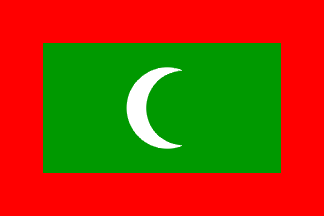 as shown in Album des Pavillons -
image by Željko Heimer, 30 September 2002
as shown in Album des Pavillons -
image by Željko Heimer, 30 September 2002
The flag shown in Album des Pavillons [pay00] is slightly different, with a narrower red border. It might be either erroneous or based on a version of the flag predating the adoption of the official specifications.
Jan Zrzavy & Željko Heimer, 30 September 2002
The Constitution defines the flag in details and gives its illustration and
its colors in British Admiralty Colour Code (Schedule 3):
https://storage.googleapis.com/presidency.gov.mv/Documents/ConstitutionOfMaldives.pdf
Zoltan Horvath, 5 July 2024
The protocol manual for the London 2012 Olympics (Flags and Anthems Manual London 2012 [loc12]) provides recommendations for national flag designs. Each NOC was sent an image of the flag, including the PMS shades, for their approval by LOCOG. Once this was obtained, LOCOG produced a 60 x 90 cm version of the flag for further approval. So, while these specs may not be the official, government, version of each flag, they are certainly what the NOC believed the flag to be.
For Maldives, PMS 186 red, 348 green. The vertical flag is simply the horizontal version turned 90 degrees clockwise.
Ian Sumner, 10 October 2012
The Flag Manual - Beijing 2008 gives Pantone color: PMS 032 (red), and PMS
355 (green).
The Album des Pavillons 2000 [pay00] (Corr. No. 6.) gives
approximate colors in Pantone and CMYK systems:
Red: Pantone 186 c, CMYK
0-90-80-5
Green: Pantone 348 c, CMYK 100-0-80-25
The Album des
Pavillons 2023 specifies the colors of the flags in three color systems.
Blue: Pantone 284c, CMYK 59-23-0-0, RGB 108-171-231
Blue: Pantone 286c, CMYK
100-86-25-6, RGB 0-48-130
Red: Pantone 186c, CMYK 10-100-74-2, RGB 210-16-52
Brown: Pantone 470c, CMYK 28-72-97-25, RGB 177-77-27
Yellow: Pantone 109c,
CMYK 0-17-93-0, RGB 255-209-0
Green: Pantone 348c, CMYK 87-24-97-10, RGB
0-126-58
Vexilla Mundi gives colors in Pantone
system: PMS 193C (red), PMS 328C (green) and PMS White.
Wikipedia provides construction sheet
and gives color values as follows:
Red: Pantone 186C, RGB 210-16-52, Hex #D21034
Green:
Pantone 348C, RGB 0-128-58, Hex #00803A
White: Pantone - , RGB - , Hex -
Flag Color Codes gives the
following color values:
Red: Hex # C8102E, RGB 200-16-46, CMYK 0-100-80-5,
Pantone
186, RAL 3028
Green: Hex # 00843D, RGB 0-132-61, CMYK 93-0-98-17, Pantone 348,
RAL 6024
White: Hex #FFFFFF, RGB 255-255-255, CMYK
0-0-0-0
Zoltan Horvath, 5 July 2024
Quoting Crampton [cra90]:
The flag of the Maldives was originally a plain red flag. Later, a band of black and white stripes were placed in the hoist.
By the early part of this century, Prime Minister Amir Abdul Majid Didi had introduced the green panel and white crescent to the flags of the Maldives. Until 1949, the horns of the crescent would point towards the hoist.
Upon the independence of Ceylon (now Sri Lanka) in 1949, the Maldives were a separate administrative entity. A Republic was established from 1953 until 1954. At that time, the Maldives had a reorganization of their flag structure. Primarily, the crescent was turned to face the fly and the Government service flag became the national flag. In 1954, the Sultan was reinstated and there were no changes to Maldivian flags. These flags continued to be used through independence in 1965.
Three years after independence, the Sultanate was removed and a Republic was instated again. The current national and presidential flags were introduced officially on 26 July 1968.
Calvin Paige Herring, 2 June 1998
.gif) image by Zoltan Horvath, 5 July 2024
image by Zoltan Horvath, 5 July 2024
The national emblem consists of a coconut palm, a crescent, and two
criss-crossing national flags with the traditional title of the state. The words
of the scroll „Ad-Dawlat Al-Mahaldibiyya” are written in the Arabic naskh style
of script.
The depicted coconut palm represents the livelihood of the
nation according to Maldivian folklore and tradition. The inhabitants believe it
to be the most beneficial tree to them as they utilize every part of the tree on
various applications ranging from medicine to boat building. The crescent (an
universal Islamic symbol) and its accompanying star embodies the Islamic faith
of the state and its authority respectively.
Zoltan Horvath, 5 July 2024
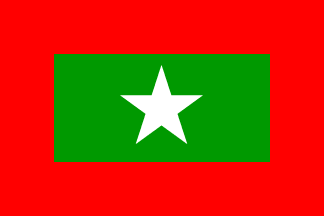 image by António Martins, 12 July 2016
image by António Martins, 12 July 2016
Barraclough's Flags of
the World [bar65] says:
"The ensign is like the national flag but with a
star instead of a crescent".
None of the more recent publications refers to this
flag, and Smith [smi80] indicates
that the naval ensign is the same as the national flag.
Vincent Morley, 21 May 1997
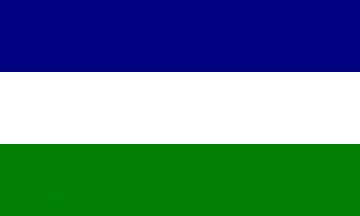
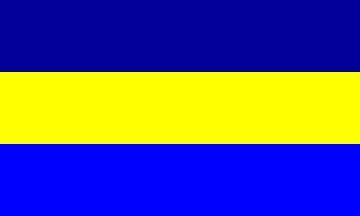
Left, as shown by Smith - image by Željko Heimer, 9 January 2005
Right, as shown by Talocci - image by António Martins, 9 July 2016
Smith [smi75c] shows the war flag of the Maldives, used on land, as horizontally divided blue-white-green, in approximate proportions 3:5, while Talocci [tal93] shows the war flag as horizontally divided dark blue-yellow-light blue
Željko Heimer & ND, 4 July 2005
I am inclined to believe that these two "war flags" may be misreported colours (ceremonial military unit flags) rather then war flags proper. Under "war flag" we mean version of the national flag used by
the military on land, i.e. flag used by "army" instead of the national
flag. For what I understood from a quick glance at the Maldives military
photos on line - they use the usual national flag and hardly anything
else (plus colours).
The current Maldives National Defense Force (MNDF) - which seems to use gray-black flag after all, and white-black - was preceeded by the National Security Service (NSS) (until 2006, according to Wikipedia), also
using gray-black flags. However, it may be that prior to 1979 when the
precessor of NSS was the National Guard - tricolour flags were used
(to denote its three branchs: coast guard, police and customs?) And
prior to 1972 there was no police branch in the National Guard... so
maybe Smith's version was used them, for whatever reason -
certainly, both sources are of the right time to hold this - but it is
still nothing more then a speculation of mine. And if it is anywhere
near the terget - these "war flags" may have well included some emblem in their centres that the two sources ignored or were unaware of.
In any case, except for the two sources, there seems to be no mention
of similar flags used by the "military" of Maldives anywhere else,
for what I am aware.
Željko Heimer, 10 July 2016